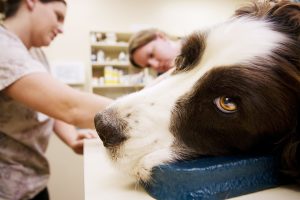Yesterday I lost a patient. I wasn’t even there.
It all started last week. He came in for vomiting. His x-rays were inconclusive. We decided to treat him symptomatically with IV fluids and repeat radiographs. They were still inconclusive, but the vomiting had stopped and he was eating and acting normally. We sent him home.
The next day, he vomited again. He came back in for an ultrasound. From ultrasound, he went to the OR.
He had adhesions from another surgery years ago—scar tissue—that had resulted in an obstruction. I couldn’t safely break them down, so I had to remove a section of intestine. The two healthy ends of bowel came together nicely. I checked the incision for leaks and finding none, I closed him up.
The next morning he was eating great and acting normally. The day after that he was fine too. On the third day, he wasn’t.
“We have to go back in,” I told his Dad. “The incision could be leaking.”
I hoped I was wrong. I wasn’t.
We removed more intestine and repaired the anastomoses. We flushed his abdomen with sterile saline to try to clean out any bacteria or ingesta that had escaped the GI tract. We loaded him up with antibiotics. We crossed our fingers and prayed.
He made it through the night but the next morning he still couldn’t sit up and his protein levels had dropped dangerously low. I wasn’t there, but I called my colleague to confer on the case. He needed a plasma transfusion, we decided.
He never got it. While the fresh frozen plasma was defrosting, he decompensated. They did CPR, but he died anyway.
I’ve been through it a hundred different ways since that morning two days ago when it all went south. What could I have done differently? Did I do something wrong? Was it my fault?
14. That’s the percent of dogs undergoing this particular surgery that encounter this complication. Not the percent of my patients—just what the retrospective studies show. And adhesions increase the risk.
This should make me feel better, but it doesn’t. Because he’s still dead, and I’m still left wondering. Was it fate, or was it me?
I know I did everything I could. I know I’m a good surgeon. I know this happens to the best surgeons. But it doesn’t matter because I still can’t stop wondering. Would he be alive if another doctor had done the surgery? Was it my suturing technique? Was it my choice of suture material? Was it my tissue handling? Was it me?
Clients often think euthanasia must be the hardest part of my job. It’s not. This is. The ones we try to save. The ones we give our all to. The ones who have a chance but die anyway. That’s the worst part of the job. It makes us doubt ourselves. It makes us feel helpless and useless. It makes us feel like failures. These are the cases that you never truly get over.
Sure, the wounds will heal, but they will leave scars. Adhesions will form. And you can never cut them out or break them down. They will sit there for years, not really causing a problem, until one day something gets stuck in our tangled web of emotions and the old wounds feel fresh again.
We will heal for our patients who won’t, but we will never be whole.
The views and opinions expressed in this article are those of the author and do not necessarily reflect the position of the DrAndyRoark.com editorial team.





